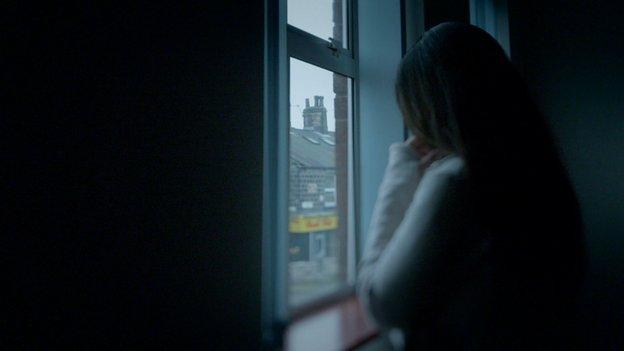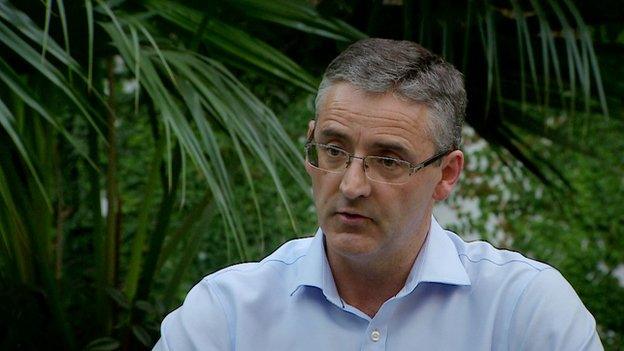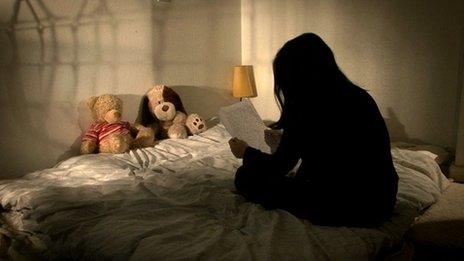Rescuing British women from forced marriage
- Published
Sana (right) says she was forced to marry against her will
We are driving though the twisting backstreets of a Pakistani city in a convoy of armoured vehicles.
I am with officials from the British High Commission on a mission to rescue a British woman being forced into marriage against her will.
Sana, 19, from the Midlands, was brought to Pakistan last summer, and told she could go to university here.
But instead she heard her parents planning to marry her to a man she didn't even know. And when she refused, her father physically abused her.
British Consul Simon Minshull says: "Forced marriage is a government priority.
"We handle around 100 cases a year here, and we'll use the option of rescuing someone where we need to."
Forced marriage is now a criminal offence in Britain, but that doesn't stop some parents from taking children they fear are becoming too Westernised back to countries such as Pakistan to marry them without their consent - often to a cousin.
Afraid to speak
Simon and his colleague Neelam Farooq draw a blank at the address that Sana has given them.
A man there denies all knowledge of her, but it turns out later her uncle lives on the street.
The local police with us have not been told exactly what is going on - forced marriage is against the law in Pakistan too but is rarely prosecuted and sometimes officers have tipped off families.
Sana is afraid to speak on her mobile - but, thanks to smartphone technology, we can pinpoint her location using her text messages.
We track her down to a large house in a middle-class neighbourhood, where officials find her with her parents.
Neelam insists on seeing Sana alone, although her father objects.
"We have some welfare concerns about her," she tells him. "And we need to make sure that she is not under any kind of pressure."

Sana is now back in Britain and determined to go to university and choose her own partner
Once alone, Sana tells Neelam she wants to leave, and her father is told she has asked for help they will not refuse her.
Now Simon must get Sana's travel documents, and he tells her father firmly: "I need to get her passport, it says on the front page that it belongs to the British government."
As her father stalls, the team know they have to get Sana out quickly. A phone call has been made, and more relatives are on their way - things could soon turn nasty.
Outside, the cars have been positioned ready for a quick getaway.
"Come on, come on - quick, get in the car," Neelam urges Sana as they emerge from the house with a suitcase and Simon close behind them.
Sana has a black eye but seems composed and does not look back.
Within a minute, the convoy is on the move. Simon has decided to go without the passport and, dropping off our police escort, we head quickly out of town.
Sana confides that she considered suicide rather than submit to a forced marriage.
She says: "I thought the easiest way out was death, as hard as that is… or get the embassy to help."
Guilt and honour
Five hours later, Sana is in a woman's refuge in Islamabad, where she will stay until a new passport and a flight can be arranged.
"Back in the UK, there are laws that prevent this - my father could be arrested, he knows that," she says. "But over here he took advantage, he's been very abusive."
Family ties and feelings of guilt and honour mean that not all rescues are straightforward.
Within 24 hours, we are waiting on a patch of wasteland near a private housing estate where diplomats have to seek prior permission to go.
This might alert the family holding another young woman against her will, so we can only hope she can make it out to meet us.
She is a British university student who came here a year ago to get married.
"Now her husband is abusing her," says Neelam, in touch with the victim via an occasional email. "And her mother is refusing to let her get out of this marriage."
The sun is going down, and, although local police are with us again, everyone is nervous.
There is a risk the rescue may not go as planned, putting both the young woman and the team at risk.
Simon quietly insists we will just have to wait for her.

Forced marriage is now a criminal offence in England and Wales
Then, Neelam gets an email - the young woman is slipping out of her house, walking towards us down a public road.
In the distance, through the dusk, we see her, a small figure in a white shawl.
We scoop her up quickly into the car and speed off.
She is clearly nervous, not sure she has done the right thing and has left a letter telling her family she has gone with the High Commission.
The next day we learn the young woman has spoken to her parents and decided to return.
"It's her choice," says Simon when I challenge him over the waste of resources and the potential danger she could now be in back with the family.
"The family now know the British High Commission is aware, so I think the risk can be mitigated," he says.
"We will continue to do rescues because it is an important part of our work here in Pakistan."
Sana, however, was prepared to cut herself off from her family to avoid a forced marriage.
She is now back in Britain starting a new life.
Although she misses her mother, she has no regrets about her father.
"I hope he suffers for everything he has done and if somehow we manage to get him back here, he goes to jail," Sana says.
"What I have done is the right thing, and I can only look forward and think for myself now."
Watch Panorama: Rescued from a Forced Marriage on BBC One on 26 January at 20:30 GMT or later on the BBC iPlayer.
- Published16 June 2014
